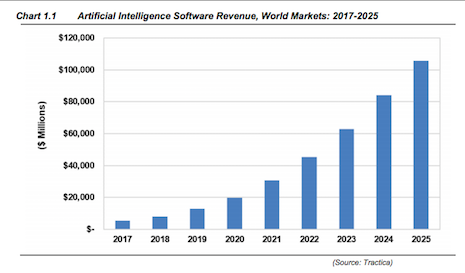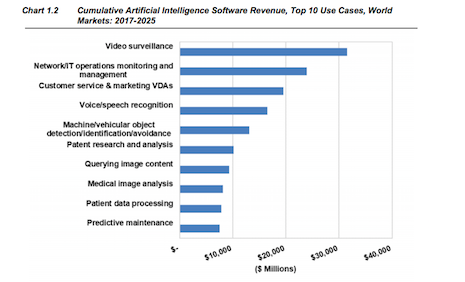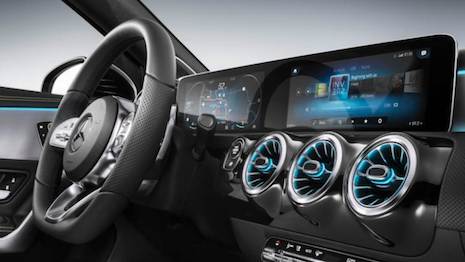Artificial intelligence is poised to play a much larger role in the retail and marketing worlds soon with its market value projected to reach $105.8 billion in the next seven years.
According to a new report from Tractica, artificial intelligence will become increasingly relevant over the next few years with a significant number of major retailers and advertisers making use of the technology. For luxury brands, AI can help them create the type of personalized experience that consumers expect.
“The types of challenges currently faced by the AI sector are to be expected as we move from a hype phase into a reality phase as part of the cycle of market development,” said Aditya Kaul, research director at Tractica, Boulder, CO.
Artificial intelligence
Artificial intelligence has been in the popular consciousness for decades, but only recently has it come to be an actual force in the business world.
Brands across sectors have begun using artificial intelligence and machine learning to streamline their data analytics, personalize customer experiences and engage with the right target consumers.
According to Tractica’s report, marketing and voice recognition software are currently two of the most popular uses for AI that can have a direct benefit on a brand’s ability to market and sell its products.

AI's growth. Image credit: Tractica
The primary category of usage of AI today is in the world of analytics.
Data is incredibly important, particularly for brands looking to personalize customer experience and target the right consumers. But it can be prohibitively time consuming to crunch through large data sets for recognizable patterns.
AI presents an excellent solution with its ability to sort through large data sets independently.
Artificial intelligence can also be used to maintain these large data sets, helping to keep them updated without laborious manual changes.
Machine learning
While artificial intelligence has often been thought of as a computerized solution lacking creativity, a recent report from Fashionbi explains that AI-powered creativity will be a new frontier for fashion.
Through the use of data, fashion brands are now looking into creative solutions that build a unique strategy for streamlining trends as well as personalization. AI is now also powering three facets of fashion, according to Fashionbi’s Artificial Intelligence in Retail report, such as customer service, product design and the shopping experience (see story).
A number of major luxury brands have already begun implementing AI tools in a variety of inventive ways.
For example, French-Italian label Moncler is promoting its latest Genius collection through a sponsored story that explores the potential bonds between man and machine.

AI use cases. Image credit: Tractica
A paid content campaign by The New York Times’ marketing division T Brand Studio showcases Kei Ninomiya’s Moncler designs on humanoid robot Sophia and actress and musician Ryan Destiny. Reflecting the conceptual nature of the Genius series, the marketing initiative aims to make the audience contemplate (see story).
Similarly, Chinese ecommerce giant Alibaba is linking consumers’ cars to their homes with an automotive artificial intelligence solution.
The retailer’s AI + Car solution allows consumers to interact with their vehicles through its Tmall Genie voice assistant, checking the car’s status or controlling settings from their home. Daimler, Audi and Volvo are the first automakers to incorporate AI + Car into their vehicles, with more brands expected to follow in the future (see story).
“Tractica sees these challenges as part of the maturity curve for AI, where the next few years will see a sobering of expectations, while the momentum around use cases and applications continues to build," Mr. Kaul said.
{"ct":"rDS\/eqmB7widsPb9O5YD3R+D0469k6fwEQkd2y4fETbxVFIfOfo6hbYoQ\/4T8GMk\/8GxmmkOTe6nW+G1mGT5RzZebD93vg\/GAitMJRMbFZdaaktVG7H+I+65Xeueh19PJ5Dl+4mQP3Q5t\/Jq+hsvVvlyD5mrI1bLz9sPCHeZy8YC\/fp5pd7Uu5sgaWEqOIKNl4s2sHNnJs0ccixKZ\/5T\/WIGEWCcd4hQ8WhY43aOqM47LcLqhZP7ICW31tsNyVcYKh5\/A\/U8KO+PoPFi4hOz9MarvCuONSaRzH2IdKRA3U2KfT1+zfJAHonUqJ8CRMm+zkuXAqeMRJhQ5oginxwm6V710ib8ioByc1tMH9d9j3Ji8Sb766r+YE+M+NKQ4vyd+sIrNCZAIaZ+6AbIDb5J5pdjt70Vsf4h67GXk+pd7s3QZlocOivcBKQaJKZ\/clCYm+izeLX2l4AsEOr2luCt6SrVnChvIaDXUwtWG1rc2aAIfc1ZJ1IKhjcj\/0QpAJGtaSwGe5QQ2uUC6c5w3MUYC+ck37iN3aiu1JPMgYwKcGAgLA\/Wf4Uej3I6QkmEpWt8y73vrn3PwzQRMvSxh7IYsd2N6sG29GwgVgz5B83eVWSFsd7UMH722cn6p9Bc4oBgg6mQWRpdoT+O28hlsEs4ziVCYq4prEiCr38cAjAdu1VYNOOLpjtdNbLq1tvjuT45DoqWvFP4Vqq1aJtan163B+zQhJhGWyLotF83qAq4eS0CQiel5jaJb\/MAQq99k+Gt8FuuWi6zTciPwBC8qPN6FIywAQovE3BUCjlfsQIQllUiV1G4shpEmvjFPGJH3hpq2wcxsIxIUfEtWWD2E3\/q73kYsZWSP1lwZvj2GRaZrzRsoa9vECv2BLupXuNEOmf4SAg1RMxyW7tGOAtqKuH\/YtUrZdl01nraOCVIJZTKbtpZ3m9Pnf7Heu\/qt4PzdSo1DENj29Pm8c\/+Dsn3udqIbAN6xhIBpondqGopGgyVQ55Syhv5a2WhRvPFId9R5o2hUqzoM\/a2GqWH4f0qYJvl\/CIfJVwIbgCyF5goFG+tzZj\/WNZ9j1w4TGOEgnd1B3z1bnzeAFYM62VihcmT657x3ns77wX2Us5DR+itFrvv2M7fnYCrfVJb2ur74Hx5bw+8m8fI8o+rruHrSSjnAv2uXlsaTFpnTG6Ds6DwFDxrsBrALAAuE19ipGC3\/xqoX5GXGpEdW0tlkiF9BpCX4jrcYWx6xeGGp1MbcbBPmhsFjhk6LK0kmcAqvqu2KJDVp5n065\/cFSszgOAJCQf1\/VBCLxDDlrordKhdzSVFEB9KK\/YnTC\/NU7Q2ZzS1Q9vcfgHToZpHtmEMS\/v7DE+9Kc8kgXzRE31ocuK0ks\/aO5n7w2B3RSX6TdBlvKhZaMfONitALCg3P422BKvqj07\/wXMGWiXvRg8XMalcWxGGnBrVokfcJ+CcHO9PgbaOwALXYhlvH6rzMsz6+WQKjcYyTGv0gXw+vzd5es0lv8cjFA7GRaWJ21IldGcHcWq4cSbo1D8TyqY11TTGknC36BWbJZozndAtMXHhlU1xk2YzVmXpFnUXH\/UC2T+g0zwQy6lye4of4Txc6H9s4go6n4DGloQjOdzNLkYKhxyBQTzGh+mfPDkX9yjGZ6cyRSfzjfDq33pAelDwsdaf5UNor33cmsN2Rd23qaLN6xXwU163BETjiEBQUJiH2NrYoAW3HlgrofW8cyvXMLaA7uRfIPRBfTzoRrtKrOL\/MjpyBgeneZpObs98wh9eo36BdFCnEG9az98Qq2LA9UlmL\/hEc6kx2sg2ZedlOFIzRd2aPVlcaPEws8Ezin5wlJqWaYn\/915lj7G0Id0yTAjyA3WHgnQlz24XCqwg\/\/KA2S1wn2huXjpf6K29mUzeRaEps1LVNR1FXaXtXCPuCNs1JpQyLb3onUf7apyd16JEPDvV6WnQvx0uQxOLYqtPnQgHvV5YcYnUDl7k4YN01voM8hlqWIDqMdEYNqWJYVjNXx7L1\/Cp5Ha3ZLYBIwfNyBq\/q66zqzsPeJEUQtkWcK9ogcB8wg6RGMJneVevnKq+Xyv2KpIp4AzyD9IqCvco6ODzthrfEvbocNXW5EHaYUq+XBi2IEEs+D2QtO8kVpmjy3sfW0mjJ5GnWjCELNZKxR\/oybldDIErBshN12683s4598AC\/LJUC3tcpZGm6YlprPTrdUvqTD5wbNpJURrPmzKmLO\/QbYe\/uGo\/KM2+I7HDaq7T5fiqUa+KWaRr4vzhRGwNaoXVc7gLxYzIbPIEKerm+SXxWqpFacplhMqLLsDXp+wOYR\/jH\/fVh7XvEUj+jt3fxNFD1BPZmzRKF7LRdw1gLHoWobI36B3uroAmwH+vQbywJle6BjZYsN5SGDQWUwlbOFnXY2h0R9el9+sW\/EJCwaVYUMnao3YyHBjDpgxK9tyXgvdDEDOEvqE4Y0LIjiF0YMu6FOxLh8LKz+x5BOAPjKlzcCpZe8cZyKwnVKVq0pHWgpY7Ky+E8Jh5vkLL9DC+qZRL0TJwBVsBN2jnHwTzzbUDosAqwMRZ4Jhlvg3+vnvsQ7pChXcDue8FORgMIaiaS+t4zfgyXihBaphSnkB7p\/gnj3QAH7Y+JTQ6Ek8qDefXioJ+jHbOwTglzrhNiPP2FuckmNVu58kntD5QNOj45Qv4yNcqMKBUjb+PVU55iKQGibHvI68YqlJ4sBja9LH42j7pkfo+zZDMKNNrpliuTexa82WzS9o4DBMWMBefm4fFmDkmg+GfSY2L3k31EEfSOMoujJdWFsJiKxqgFZTVSRSGrnXW40BfqiX3t5gP8U6wnGK09txfY6Uh2er+N8M7zylQ10MnynDyjwiRh0fVVDEKXLGIIc5hCjyGFV5N2pqojOAS\/Z8zWXuW91Nf5DPm5yawyHBqiRAg+e5AyyMZmFzobbzFF91Tz7HimDdgfiJyh5BMuRwbZm3Z1XgrcVVILM6DHDvGAME34JyEGPn1Zlk4k+tisKk3+Uo9yHNRQXfNTFLimG2MkZiblIs8OmHNbO7UJ2KfAoIRGoXADFgpiEC7kkW2LVu98qYmhkcQwCALi2pMeLIvzLN7dVSTQbL0zeQxtPcr8ONknaslrMF\/FmbfdmwYawJjFg67q\/Xg6R\/fBh+weEVoe\/fr6kyCC\/\/EcJMp\/SljHohebmwgG7GFpJvh3DtGo77VUpiRrQygqwwOliVkD8iq1Emxgjken++oztHGFDAoo3mpCs0oebiII+0GRy\/P61Od02s3n97r1\/8TovwnW8D8pFs5G77i6S7efDO8dRzGvqRMbKAbEA+FXty1DAzZqiUlfIMBPEzXK\/4HTbAwgKPQaQvnvp1l2PDuRhv4CWYt1bp89vVJd51V6fsbmg\/PRnuj5nNAuhS8+QcLmhxIYLjyfzMLq\/1tGu3n48aHK9ZEkz+6Pey+e3B9qTkUhorilKOaSIJpfnNVOAWgrhSxiaubXe\/YJxL2p1GQ5CxdqE9WEMHJuryxu+idYB5VG7ibWtQZ50Q9dac9vvL2\/w1\/PXyXFvlvdSQ7pTZthnU+qez748bD9EEgeSHuQPEBOEaUZjv3QJUk9zTGx3kPQErKL\/2D3b4QpPGLoR8kg9yznsQ60FyGUXK8WoiwM0eZWA22RAr2\/aZS3uk5vN8KrVLCdiWsVQfbD0Jy+Ks3MW4VSfub+zbAQ2b0vzfCmKpSNR+C\/J\/++4mc8Z21lnRAtkoTvZ6eizFMNOtwyGMFnfnn+X1qsSDb1M0W6Xc83D8kIiZ7iGPROplPQLabncEYLy3b+DPV7V3XWPSoS\/H+5ooW49VWQGk7uaL2oIywJU83Td7wCyJv064\/MDGlolVkO7hg++M\/o57SPeDDehJt6NdjgSutCUz9Zrsn\/ieq8Xa9VhBrs2tKr3bRUgvJMaC8g9C10SsWElosbCPT48le\/sjKwYaJDuSQg2CMs\/PIDhMd2ZirjaUZxyzMBw5PkutnP1u\/JnqZ5Fh+Ahxv9TxcLXsRRG2e3vjUTOH7hMLhC6D\/m3xN2iw7Gje2b755R1Vg1IEUE+4QaD37hyazr1xNE0vWY9wJ5uyBrJ+Pn+hyRPTtE5GeLr6we1TGoTHUkGg0PeQAshtT\/x+++s0tDbmvFBJ493MpLa9fYnPk6FUKMQ0IgZXW7Ha9ZEDQbABCoCQQgb20w649kJ6SIrvvVRVP8II9AH6A+6748oEcxgWfujk8MOLHSIAj4SX1Zusc0jL0gtn5EC3QKFPAZVxIwOaXhpPsE+nON9kqLo42Z+YBHBQPp1wT4uLMT4QywXIuZmgA7DW2RrcFUxYoGHeCKIkUxAgMOJOzYAccauejKmL5sjvwZk2yJjZ7EsPXLCIdP1cMbFsIkvPLvha7rBVu5ldb6xlVXy1YtGlE\/kqBDNvRQ62yxFaM3\/imerWgVy8T9vNpkKWb+bwKxtZ1sqgATV83UlQ6mqMZ5CNTOIQlHPHF7JmIrfcGQPbXhCEDC8S7ga9abEwMOuN06Ujr+Wk7v19dtlqASTbN5GG2g1Hv9S\/W1TOVcX60X8WH5NTWRKx\/17zl3jEf8cl6n0HKQToeyfgaDrOx2TfCfw62pQZjqTBda1cXDdDNt5lNQ7FZMSe3\/vxSSb6o\/d2UU++Q9UgH7SYvDXMzrVIX0vRoD49BJWxHEJzDN\/GjhIviGaCjWDdATB8F7WoxenN+RrmuZmxX3DEGjGGqF3V\/3mT5aroIfQgm4E9Pl2EhGqkvysmUK5KKAeEVxXkShuUkFkFi7Uu17xjXTD6cO6Qe\/67MtAVCkZqKfLXOMESHpCNiEhJvCwhqMkD+LVgPAwu52VJCGRRS9MxVm6aqCejgkRV\/SekgyhBrE2fzEhOXdIK+BwurRbwOkmPViZp0b434HCraugrF6Y+OCqvlTS8kzh4eP+0oqmqnZOB0zmk5XGkf45a7\/D4I42TC7PzSm4P6jc7VPn75Lr6FhLWBeHNndWP9jfO4daEQGcs8Soq+pXKyMKyyhZH9uSSeijFxgeNLkSNDlf2GssPzQKiuObcV44unGpoMQfGZTDJG1\/RPH6cFou8Zn4rO56HV+L9Nf53dRXZ6KsMDi+u0UdnBX5B58TETW74m2chEInSf9nq129H+Z5p+p8pLLYH8UnjOGjisd9VDmx1HTgOpqWnmoq4zH2+a1n8BwhBGFXlMbqmZYOvDNWC3LJnYB3CelCqa1SNWSw7w7be7oZLWM0DTa2sgoTMWvG4XcttxrJjC58Af1he0yojSVfidqAv6r9QU43ZdWX8l2UsCxQfzF3taSOmPmDOp\/Hx0pqTj9Mvn9jJQinly1YpEjEB7gZnUZLmc+tAoOIPEMXByDUrBMglBQa+F2OzRLjBSlBfhn3jqLPafalYi\/3RxBv6p0XMzw7xYWyPvJyU9KWX0wZF3wVQ+pSzUh3uZMYELULMHPDa83IJhOkLBazkqfLLdEmXhe1vH1NOLwU0inQAKJKvxDo6TT5ywY5D6I3rv5IcSJQnxRV4TmMNb76reYKcAflM3mREpmjzIASu9G9uUcRvEyFTn+XoH+S7i63umlupZW3ArU4mZwjXgEA64DYj41SbdnVCQQ8TPB0\/5rVfefvYXB4CLJOHzeRAOKw+WQIVayTXvocfJpKh+6cOyCOJGZgwdin16pOQPD0uNf9kMMkFY0q0UxzN69qPhvwPY2GRF7onyoBgwvGin+6COOLeM790PQRgGxThaaQyRT1KpiGjhY+fqW42ziGUpECoqpTSvLz5xZflQMPQ72FMsHsFXx\/pePipji4fDavwi7uYWLoTCo3wJ2vWMrVmgtxaDnPuFMGiDdB0KHQw+RCdbQpUj\/W69oMEsf0Ba6PTC5J1nzwu1xtSwWvNq8R\/zYUYbYPIg8u1XIZMOtHLZafUnNDoCtESge0qGL8jr+RBP\/N7CWpf7\/H5\/21P3ui0xL5y9zG877Iq7gplkCBKhZC4o0k4YHVY9KUp8z8qTLGzQzoQ5M4Jhd31aDAUQii6Jf1RkyPUUD36wD7yoMfDu\/4giHOm2hLH+2JWNP3sFco7J1yi3T3z1FebVDO7Fpr9\/Kmb97zwtRTn3n8PVZwL9euGG7Uzw2V7jeUV+sns6O3KDF6d7oSmtcys7aliimQ+H4\/\/o8O9LznN04sUejwAMHdnUlU3hZynmXy\/dVsbnbWR0KbLzbMgArV6TtQJlazBFVnSfcavbyN4LBFPS5txqVXccYNuU+laGzwlXaUZdjN5i4U0fMYAWpt5eBUyhaJP\/AU\/shdza9ocA\/AxhJKfonXZfiL4RVGT8fX3C57K+nhDqLN3cVFI\/CpTgPzC\/iOaCfot0aU8XOogFzqvLcSCUPs61rJe4dodn5Rlep6nXqZ2hAEnoRB\/ZJKpNru4ityVliw8ntGLYJ4kaBhZRvHT7apYQjcpjRX6gE7w2NfTY3p920zAAdzlHVJCHJNxlG5g9hmpn1ynjk3VfgkLc\/syvc7v+6TITS2S0OBQUq3EwEx+ybv6CL4WbOyjlWkTWWYswx3H9ILOEr3fkDps6l3bY5FFPJB2rjVaLm9UUh2Amx+xdL952AY2wCHM+cSLpvg8FGpMsFaFaQMJK5qqy1FHbV1Y6PeQJnNO9plVtndtk0xVw+9Hq6yxvDT4xUHYiHmBV\/CCC2gxw98Q8uajL6nKnX7\/iKY5LNaD8FhWInj0DqZ2GXaIK3+UhJk7QEUpSQ8yyECeYcWMIBKFdJRtaiDD9iqC2yjoEV+0kGJGeKzOBzgJ09SqUx+qwPRm0+08LznAcSH86FukPorZywa+yTILs13mzSdGmrB2iHCSrAQyC8NNm8nvi37szyBdz+oRHeMqqqqCWe3pPA5KgXi3XPHwswFO+Hf77Qw0+kLrpx9rAFY3HRRgxyZst16kuGNDyUB7TJsf4kzk0D5nfVqfaYBNkIXgODgBaG9CKyeOALk8buMAhBlFwlJcMfo3yNTFjLan0jWLhL5NBlluS7aPexCpyBlaww9smmeiE3yM31U+t7mLGNke7DHlbQZHp8\/zTrdXN7PUwlLDdT8pZuXerHYZ1idT0madDQEX9gwYp7q+1cv4EWCR2pDDLDQar5I2+FtUqtZgUEyOwEcVUIqVTgBcJiaBOL3GAwlK4vrj0u\/NCkPEOG5hx43BOA7w8ohr4zg0rTZuB8YhGHCxihdMTyRYh","iv":"4740a4508bc90c1175a58fbb7d9a05be","s":"6132d93d95d179d1"}

 Artificial intelligence can help luxury brands personalize content and engage with customers. Image credit: Alibaba
Artificial intelligence can help luxury brands personalize content and engage with customers. Image credit: Alibaba